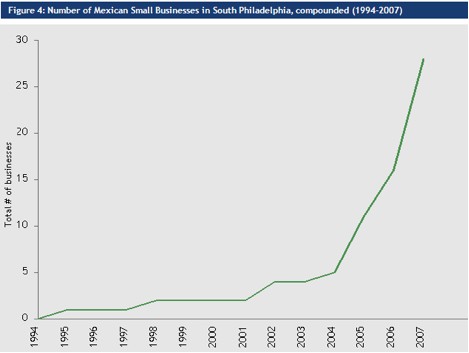The New Entrepreneurs
Recent College graduate Oscar Benitez sheds light on the economy of Mexican business ownership in South Philadelphia.
Priya RatneshwarDuring his sophomore year, Urban Studies major Oscar Benitez, C’09, received a grant from Penn’s Institute for Urban Research to study the domestic economy of a small but growing immigrant Mexican community in Philadelphia. Over the course of three years, his research turned into a 90-page thesis that took Benitez both to the taquerias of South Philadelphia as well as to the offices of City Hall.
Benitez explains that, unlike Los Angeles, Miami or cities in Texas, Philadelphia has not traditionally been a destination for Latin American immigrants. However, in the past two decades, Philly and other Rust Belt cities like Detroit and Milwaukee have seen more than a 90 percent rise in their Mexican populations. Additionally, Benitez found that since 1994, the number of Mexican-owned businesses in South Philadelphia grew from one to nearly 100. His study explores the opportunities provided by local conditions to immigrant entrepreneurs, as well as some of the social, cultural and economic resources these entrepreneurs draw upon when they engage in new business formation.
“My thinking was that no one has really studied the presence of immigrant-driven small business entrepreneurship in a non-traditional immigrant city,” Benitez says. “And Mexican immigration is generally studied hand-in-hand with labor. The presence of Mexican entrepreneurs challenges the notion that Mexican immigrants are primarily low-skilled, low-wage workers and begs for research in the field of immigrant entrepreneurship.”
Benitez’s research finds that the shift, in recent decades, of Philadelphia’s economic base from manufacturing to the service sector has created jobs attracting Mexican immigrants to the city. Responding to a need for goods and services tailored to their community, some of these immigrants established small businesses—primarily restaurants and mini-markets—often taking advantage of low rents in formerly blighted commercial quarters. These small businesses have continued to hire employees and to inspire and train new business owners from within the community.
 |
“My study shows that Mexican entrepreneurship in Philadelphia serves as an alternate form of assimilation and wealth building in a non-traditional destination for immigrants,” Benitez says. “Additionally, I have anecdotal evidence from both Mexican and neighboring non-Mexican business owners that entrepreneurship by these immigrants has been a catalyst to revitalize commercial quarters that were in economic decline.”
Benitez collected data for his research by first conducting a “windshield survey” to identify all the Mexican-owned storefronts of eastern South Philadelphia. “I walked and drove up and down every single north-south and east-west street in a five-mile radius to map every business I saw,” he explains. He followed up by surveying and conducting in-depth interviews with a sample of the business owners to glean qualitative information about their entrepreneurial motives, challenges and successes.
Benitez’s Spanish language skills and personal background helped him build trust with business owners that proved essential to eliciting candid and detailed answers to his questions. “I’m an only child,” Benitez says, “born and raised in L.A. by my mother, who fled El Salvador more than 20 years ago and made a living for us as a domestic worker. I can identify with the stories of these entrepreneurs coming to this country and trying to make it on their own.”
To ensure that his research did more than “just sit on a library shelf,” Benitez approached Philadelphia mayor Michael Nutter’s staff in the Managing Director’s Office and other departments in City Hall to understand the institutional context in which the Mexican business community has grown. He discovered that City Hall had been engaging in a variety of efforts to encourage the commercial activities of immigrant business owners to help stimulate the local economy, establish Philadelphia as a “global city,” and combat the city’s decline in population. The mayor’s staff, in return, was eager for the information provided by Benitez’s research on a community they knew little about, and he delivered to them a copy of his finished thesis.
“I hope my work will serve as a voice for the entrepreneurs themselves,” Benitez says. “This is a demographic that, in the most general terms, is not well received in politics because of the debate over undocumented workers. I don’t know what the documented versus undocumented breakdown of Mexican immigrants in South Philly is, but these business owners are each investing, on average, more than $40,000 a year to open a business. They are invested in the most literal form in Philadelphia neighborhoods, and I think it’s in the city’s best interest to make sure this group reaches its potential.”

